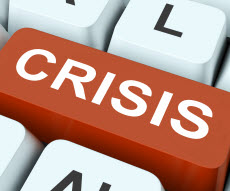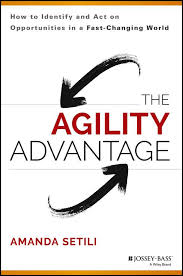
We’ll all been there. Things are running smoothly, then whack, seemingly out of nowhere you get hit over the head. You lose your job, your competition takes away your best business or someone in your personal life drops a bomb on you.
You never saw it coming, except of course, you did. Now, with the benefit of hindsight, you can see that the signs were there; you just didn’t recognize it at the time.
Business Strategy expert Amanda Setili says, “People get blindsided because they develop certain beliefs based on experiences they have. This can happen in business or in your personal life.”

For example, I’ve had clients who believe that sales is a one-time event, once you secure a customer, they’re yours. This belief can blind them to signs of competitive threats. On a personal front, if your parents stayed married forever, with never a date night, you might miss signs that your spouse needs more attention.
Setili, a strategy consultant (www.setili.com) who works with organizations like Coca-Cola and Delta Airlines, says, “People get so focused on what they are trying to achieve and what they need to get done, they don’t look around and notice what’s changing or what is different.”
A large-scale failure to notice advance warning signs occurred during the Great Recession. Everyone was focused on growth. People were so emotionally attached to the upside that very few noticed the foundation was crumbled. Even when the economy began to tumble, people were so surprised, most did not respond quickly. People sat stunned watching their businesses and bank accounts shrink.
Setili says people get blindsided because “They don’t take the time to ask the question, what might happen next, or how can I take advantage of what might happen next.”
You can avoid many unpleasant surprises by looking up, looking around and looking ahead. Instead of just thinking tactically, what do I need to do today, ask yourself, how is my situation, job, marriage, company, family, etc. different today than it was a year ago? Are there early indicators of future problems, or opportunities?
In her new book, The Agility Advantage: How to Identify and Act on Opportunities in a Fast Changing World, Setili recommends, “love the problem.” She says, when you’re facing a challenge, you have to be willing to manage uncertainty, which means digger deeper into a problem to find new insights before you jump to quick fixes. In business, if you see early signs of  competitive threats, don’t jump to a tactical response. Instead Setili suggests, talk directly to customers, observe their daily environment, the tools they use, and the people they interact with. This investigative work will give you insights that enable you to formulate a better strategy.
competitive threats, don’t jump to a tactical response. Instead Setili suggests, talk directly to customers, observe their daily environment, the tools they use, and the people they interact with. This investigative work will give you insights that enable you to formulate a better strategy.
In a personal situation, you can avoid being blindsided by paying attention to the people around you, and thinking about where things are heading next. For example, with my youngest child leaving for college next year, Setili suggests, “Plan something exciting for yourself, so that you have something to look forward to when she leaves.”
Having seen other parents stumbling away from the dorm drop off, blindsided by unexpected heartbreak that their 18-year hands-on parenting odyssey seems suddenly over, I realize most parents plan their child’s big moment, but very few plan for their own adventure.
The future is always going to have an element of uncertainty to it. But if you pay attention to the early indicators, you can avoid being blindsided.
Comments are closed.